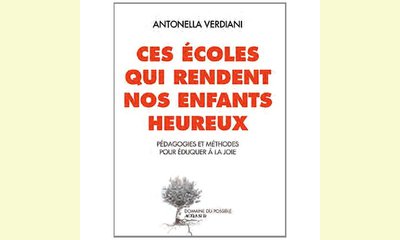|
|
Another kind of school : An education of happiness explained by Antonella Verdiani
un articulo por Marie Pâris, Terrafemina
Antonella Verdiani, PhD in Education, will be
signing her book "These schools make our children
happy ," in bookstores on September 26th. The
book describes "pedagogies and methods to educate
joy"which she has observed in France and around
the world, including at UNESCO which is
responsible for education issues in the UN System.
The book provides details and arguments to explain
the various alternative pedagogies and their
values.

click on photo to enlarge
Our conversation.
Terrafemina : What can be criticized in the
traditional French education system ?
Antonella Verdiani : First , it is far too rigid.
The various subjects seem unrelated to each other
... And learning by heart is the center of the
system , without giving children the opportunity
to express themselves. Discipline, by itself, is
useless ; if one is to advance, discipline should
be joyful. The Italian system for example, that I
experienced as a child is much more based on oral
instead of written instruction ; in philosophy,
all courses were conducted orally.
TF : How can one imagine school evaluation without
tests ?
A. V : Traditional schooling is based on
competition which requires testing. With testing,
we forget cooperation. It's like capitalism.
Instead of this, if we use the method of Free
Progress, the children evaluate themselves, which
is much more positive.
TF : In various alternative schools that you
mention in your book , what are the educational
elements that "make children happy"?
A. V: First, the child is placed at the heart
of education, and everything is based on freedom,
not only freedom for children to express
themselves orally, but also physically ; it is not
required for them to be seated, for example.
These methods also give importance to the body
there is a balance between the mental and physical
development. Without addressing religion, these
alternative pedagogies are open to the existential
dimension of life; we should not be afraid to
address the issue of death, for example, faced
with a child who loses a loved one. A place is
given to emotions, unlike traditional school where
the child must not cry or laugh too much.
TF : What personal experience do you have of the
school, as a former student and mother?
A. V : As for me I went to school in Italy,
which was already much influenced by the
Montessori system. When I had children, I had the
opportunity to see different methods through their
choice of schools : my first child went to a
public school in Paris, the second to a new school
functioning similar to the Freinet system, and the
third to the alternative school Brockwood Park in
England.
TF : In your opinion, how do you see the future of
the alternative education systems that currently
exist ?
A. V: We're at the beginning, but there are
already a lot of experiences that take place in
the field of alternative pedagogies, and also at
the university. The problem may be that these
initiatives are too isolated.
TF : How do you see the future of the school in
France ?
A. V: I hope that the school reform now being
instituted by the government will move in that
direction ... I'm confident of this since there
are some representatives of alternative schools
among the experts who reflect on the reform. We'll
see what comes of it ...
"These schools make our children happy ," Antonella
Verdiani , Actes Sud - Domaine du possible 22 euros.
(Click here for a French version of this article)
|








|
DISCUSSION
Pregunta(s) relacionada(s) al artículo :
What is the best way to teach peace to children?,
* * * * *
Comentario más reciente:
Maria Montessori believed that peace was innate within children. Her timeless educational philosophy was developed around this basic understanding. Perhaps all we need to do as teachers is to provide stimulating learning environments that validate this knowing and understanding and nurture it. We may not have to actually teach it, Sharing peace-building stories gently attends to this. Strong, creative and imaginative peace-building characters who focus upon win-win and have faith in peace being possible are at the centre of the story plots. In Hassaun Ali-Jones Bey's (Boundless Gratitude http://boundlessgratitude.com/products.html ) unique and mesmerising story, Black Ink is such a character who bravely crosses the universe seeking validation of what he knows in his heart. The magical character also models all the important peace-building values, understandings and actions needed for peace-building. I believe also that peace-building must be modelled and the whole teaching-learning environment should reflect similar values, understandings and actions...as is the primary focus of the Save the Children Australia UN Global Peace School Program upon which I am presently fortunate to be working. . ... continuación.

|
|









